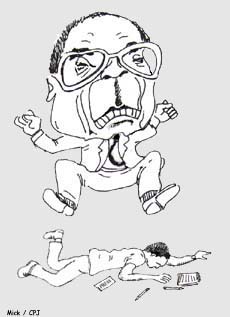
Zimbabwe Special Report: On a Rampage
New York, July 11, 2002–Tomorrow, Andrew Meldrum, a U.S. citizen and the Zimbabwe correspondent for the London-based Guardian newspaper, will go to trial on charges of “abusing journalistic privileges” and “publishing false information.” On July 22, his colleagues at Zimbabwe’s independent Daily News, reporter Lloyd Mudiwa, editor-in-chief Geoff Nyarota, and staff writer Collin Chiwanza, will…
Mozambique Report: The Murder of Carlos Cardoso
IntroductionIn July 2001, a CPJ delegation visited the Mozambican capital, Maputo, to learn more about the murder of journalist Carlos Cardoso, who was gunned down in November 2000. The delegation included board member Clarence Page, a columnist with the Chicago Tribune; CPJ deputy director Joel Simon; Africa -program coordinator Yves Sorokobi; South African -journalist Phillip…
Attacks on the Press 2001: Africa Analysis
Silence reigned supreme in Eritrea, where the entire independent press was under a government ban and 11 journalists languished in jail at year’s end. Clamorous, deadly power struggles raged in Zimbabwe over land and access to information, and in Burundi over ethnicity and control of state resources. South Africa, Senegal, and Benin remained relatively liberal…
Attacks on the Press 2001: South Africa
While the South African media is widely respected throughout the continent, the South African government’s attitude to press freedom is riddled with contradictions. On one hand, the Promotion of Access to Information Act, which went into effect in March, granted citizens access to any personal information held by the state and private entities. The authorities…
CPJ concerned about deterioration of press freedom conditions in SADC region
Your Excellency: The Committee to Protect Journalists (CPJ) is gravely concerned about the deterioration of press freedom in several SADC member states, including your own country, Malawi. Our research reveals an alarming pattern of harassment and intimidation of independent journalists, severe censorship, and the use of repressive laws to silence those perceived to oppose ruling parties and governments.
South Africa considering invasive interception and monitoring bill
New York, August 3—The Committee to Protect Journalists (CPJ) is deeply troubled by South Africa’s proposed Interception and Monitoring Bill, which empowers the police, the National Defense Force, the Intelligence Agency, and the Secret Service to “establish, equip, operate and maintain monitoring centers.” If adopted, the legislation would allow the government to monitor electronic and…
Journalists subpoenaed in murder case threatened with death if they testify
New York, April 27, 2001 — The Committee to Protect Journalists (CPJ) is gravely concerned about the safety of two South African journalists who have been subpoenaed to testify against a murderous vigilante group that has threatened to kill them if they comply. In August 1996, journalist Kobus Louwrens and photographer Christo Lötter, both from…
Attacks on the Press 2000: South Africa
A LONG-AWAITED REPORT ON MEDIA AND RACISM IN POST-APARTHEID South Africa was issued in August, to the relief of many who had feared it might erode constitutional protections for press freedom. Titled Faultlines, the report of the quasi-independent South African Human Rights Commission (HRC) was the end result of an investigation announced in late 1998,…
Attacks on the Press 1999: Africa Analysis
By Claudia McElroyAll over Africa, conflict continued to be the single biggest threat to journalists and to press freedom itself. Both civil and cross-border wars were effectively used as an excuse by governments (and rebel forces) to harass, intimidate, and censor the press–often in the name of “national security”–and in some cases to kill journalists…